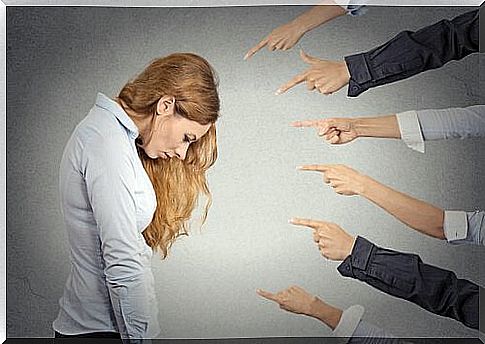Frustrated People Like To Judge Others

All people, regardless of religion or social group, expect society to treat them fairly.
When we talk about justice we have to take numerous points of view into consideration, but in this article we will not go into the legal point of view, but rather look at the psychological aspect of judgment and being judged in everyday life.
“It is much more difficult to judge yourself than to judge other people.”
Antoine de Saint Exupérie
We agree that some people do not make their judgment on the basis of specific and isolated situations, but rather take on the role of judge over the everyday life of other people without being asked to do so by them.
Of course, this is a mistake if not even a judge has the authority to act like this outside of his courtroom because he was only appointed for that function there.
Why is our society full of false judges? Why do these people think that their own values apply to themselves and others? Why do they judge others? How did these people get to this point?
“I hate judgments that don’t change anything, just destroy it.”
Elias Canetti
It is interesting to see what traits these non-commissioned judges have in common, who in some situations take the liberty to make harmful and hateful statements about everything and everyone around them.

People who judge other people:
- … mostly abhor a large part of their own life and for this reason try to poison other people’s lives with their views.
- … are not satisfied with what they are doing and cannot cope with the fact that other people are satisfied with their life.
- … are not easy to recognize because they are usually not cold people and do not have a negative attitude. But they are usually extremely frustrated and this frustration leads to aggression, which manifests itself in its various forms.
- … are tormented by the decisions they have made, perhaps even driven by external influences, without actually wanting these decisions. You live a life full of psychological conflicts that revolve around the choices made in your own life.
- … want to justify the course of their own life by criticizing the life of other people. In some situations they use the famous justification: “I’m actually not a bad person when I look at X’s life.”
- … undoubtedly talk about people and not about ideas.
- … do not judge other people from an objective point of view that would shed more light on the wrong decisions and the successes of these people. They base their judgment on the simplest of polemics, which are reflected in their subjective impression, their simple way of thinking and their envy.
- … have values that are not suitable for calming their own lives and the lives of those around them, but that are only designed to constantly criticize other people.
- … have no hobbies or activities that they engage in.
- … are mostly uncritical in assessing their own mistakes. But they don’t like being criticized for a task they are performing.
- … are easy to irritate and then react irritably.

- The successes of other people are owed in their thinking to external circumstances, coincidences or favorable circumstances, while their own successes have arisen as deserved, justified and independent of any lucky fortune. In other words, their success is legitimate, while other people’s success is based on chance.
- They believe that those around them are busy making value judgments about other people so that they don’t have to grapple with their own achievements.
- These people do not share their opinions in the presence of large numbers of people. They are not interested in this, otherwise they could be exposed.
- Their reviews often show a desire to experiment with what life has withheld or what they have not been able to achieve on their own.
- They are not interested in improving themselves, but rather think that the best way to stand out is to neglect other people’s accomplishments.
- They give their value judgments on things that are unimportant and private to public and dangerous matters.
It is best to ignore these types of people and never give them power over you that allows them to question your reputation or job performance in front of your friends, family, or any other type of audience.
The only antidote to these people is ignorance, but you also have to be very vigilant at the same time so that these people don’t overstep the limits of your privacy to the point where they can harm you.
“There are lights that shine on everything, just not your own chandelier.”
Friedrich Hebbel









